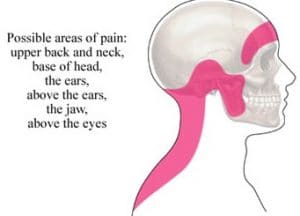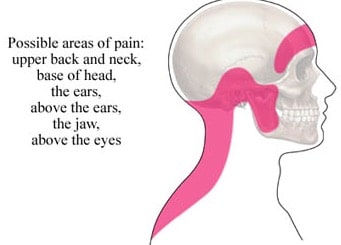
Overactivity of muscle contractions, causing tension headaches
Tension headaches are caused by contractions of the head and neck muscles.
The pain experienced by tension headache sufferers is often dull and persistent.
Overview of tension headaches
Studies have shown that tension-type headache is the most common headache disorder, with approximately 7 million Australians likely to experience this type of headache. International studies have suggested that women have a higher rate of suffering from tension headaches (41%), when compared to men (36%). Click here to see more statistics on the prevalence of tension headaches.
The World Health Organisation states that “the onset is often in teenage years and prevalence peaks in the fourth decade then declines”. Tension headaches can be very debilitating due to reduced work capacity and socialising events.
Locations of symptoms
Tension headaches often begin at the base of patients’ skulls or temples. Then, the symptoms radiate and spread, which become more like a band around the head, which can be seen in the image above. Patients can feel tightness or pressure around those areas, and these may last for a few days.
Triggers of symptoms
Many factors can contribute to tension headaches. Some of which are listed below:
- lights
- prolonged reading
- loud noise
- poor posture
- overuse of medications
- anxiety and stress
- emotional distress
- depression
- fatigue
So how do I get diagnosed?
There is no specific test which examines for this type of headache. However, through subjective and objective examinations, conducted by doctors or medical professionals, tension headaches can be diagnosed. Imaging can also be used to detect any abnormal symptoms.
Treatment options
Below are also some tips for you to take away, so whenever you feel that headache coming back on, remember these:
- De-stress yourself by relaxations!
- Have enough sleep and regular exercises
- Eat well
- Try deep breathing exercises
- Use heat or ice to reduce pain
- Massage of the neck and shoulder
Consult your GP or see a headache expert to help reduce your symptoms.
References
Greatist.com, J. (2017). 6 Breathing Exercises to Relax in 10 Minutes or Less | TIME.com. TIME.com. Retrieved 18 March 2017, from http://healthland.time.com/2012/10/08/6-breathing-exercises-to-relax-in-10-minutes-or-less/
Overview – Mayo Clinic. (2017). Mayo Clinic. Retrieved 18 March 2017, from http://www.mayoclinic.org/diseases-conditions/tension-headache/home/ovc-20211413
Tension headache | myVMC. (2017). myVMC. Retrieved 18 March 2017, from https://healthengine.com.au/info/tension-headache
Tension-type Headache – Headache Australia. (2017). Headache Australia. Retrieved 18 March 2017, from http://headacheaustralia.org.au/headachetypes/tension-type-headache/





